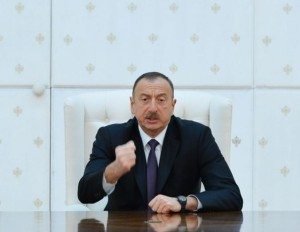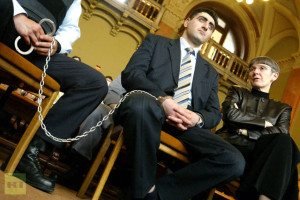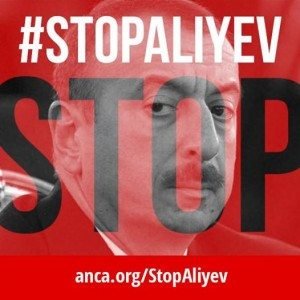Early on Sat., April 2, the Organization for Security and Cooperation in Europe (OSCE) Minsk Group co-chairs expressed grave concern over the reported large-scale ceasefire violations that were taking place along the Line of Contact (LoC) in the Nagorno-Karabagh Republic (NKR/Artsakh) conflict zone. Just as the recent violence broke out, Russian President Vladimir Putin called on all sides in the conflict to immediately cease hostilities; EU Foreign Policy Chief Federica Mogherini called on all sides to show restraint and observe the truce; U.S. Secretary of State John Kerry condemned “in the strongest terms the large-scale ceasefire violations along the Nagorno-Karabagh Line of Contact, which have resulted in a number of reported casualties, including civilians”; and Secretary General of the OSCE Lamberto Zanier tweeted, “Worried at developing situation in Nagorno-Karabagh. Sides should cease military operations and return to negotiating table.”

World leaders have neglectfully remained impartial in their condemnation of the violence, intentionally selecting not to apportion blame to belligerent Azerbaijan. And, while the world has been silent, in the recent major escalation of hostilities, Armenians have lost 18 soldiers, 12 Azeri fighters have been reported killed, and many more have been injured on both sides. More worryingly, civilians have been attacked and innocent lives have been lost, including one 12-year-old Armenian boy. Civilians and soldiers on both sides are the latest victims in Azerbaijani President Ilham Aliyev’s reckless campaign to remain in power at any cost.
It should come as no surprise to the OSCE, Europe, Russia or the United States that in his attempt to assert control, Aliyev is becoming increasingly bellicose in his behavior. Radio Liberty reported in January this year that scores of people, including opposition activists, were detained in Azerbaijan amid countrywide protests over worsening economic conditions in the oil-rich Caucasus state. Despite the well-documented appropriation of oil revenue by the Aliyev family, world leaders largely remained silent. It was up to rights groups, Azeri activists, and NGOs to express grave concern for the increasingly authoritarian and repressive conditions under an Azerbaijan led by Aliyev.
In his article on the first-ever European Games in 2015 hosted in Baku, the Guardian’s Owen Gibson, echoing the sentiments of human rights groups, warned that Azerbaijan was an “authoritarian state that has used [the games] as an excuse to accelerate a crackdown on freedom of speech and democracy.”
It should be noted that the government of Azerbaijan had banned the Guardian, along with a number of media outlets and human rights activists, from entering the country to cover the inaugural European Games. In the case of the Guardian it was due to an interview by the news outlet with Khadija Ismayilova, the Azerbaijani investigative journalist who has uncovered corruption and cronyism in Azerbaijan.
The U.N. Human Rights Council delivered a lengthy condemnation of the human rights situation in the country after the games, calling on “Azerbaijan to end its crackdown on civil society.” Notwithstanding, global commendation for Aliyev’s regime had already been established through International Olympic Committee endorsement and the participation of some 50 nations at the Baku games.

In 2012, Aliyev’s impunity became well established. When axe murderer Ramil Safarov was extradited to Azerbaijan and greeted as a hero, he was immediately pardoned and promoted in military rank. He was released into Aliyev’s hands by EU member state Hungary despite the illegality of extradition. Safarov had been convicted by a Hungarian Court for the murder of Gurgen Margaryan, an officer in the Armenian Army who was asleep at the Budapest military academy where the two were attending English-language courses organized by NATO. In a commentary, Al Jazeera’s Sarah Kendzior reported that the release of Safarov into the hands of the Azerbaijani administration served Aliyev’s domestic ambitions through “politics that strengthen pride by encouraging enmity.”
Aliyev’s Karabagh war rhetoric and ceasefire violations have been too consistent and numerous for thorough description in this article. For authenticity, I have included one example as reported by the Armenian media. In 2015, Aliyev is reported to have declared that “Azerbaijan will eventually gain control over not only Nagorno-Karabagh but also Yerevan and other ‘historic Azerbaijani lands’ in Armenia.”
Statements such as this over the course of a number of years have added to Aliyev’s development of an Azeri identity defined by its animosity toward everything Armenian. This includes a hatred of Armenian monuments of historic, religious, and cultural significance within the territory of Azerbaijan. The complete destruction of the Djulfa Cemetery took place in 2006. It was left largely to groups such as the London-based Institute for War and Peace Reporting and the American Association for the Advancement of Science to condemn the destruction. Efforts by Russia, the U.S., Europe, and the global community to visit the site and view the destruction are best described as weak and intermittent.
 The Aliyev regime has plodded along unchecked by the global community for decades. It has racked up a long list of corruption allegations and human rights abuses. Dissidents and activists have been arrested; press freedoms have been destroyed; and Aliyev himself has been accused of siphoning state oil revenues. In this destructive and untenable political situation, anti-Armenian sentiment in Azerbaijan has become the only unifying force, propping up the Aliyev regime. In short, Aliyev must maintain a state of war to keep his grip on the presidency.
The Aliyev regime has plodded along unchecked by the global community for decades. It has racked up a long list of corruption allegations and human rights abuses. Dissidents and activists have been arrested; press freedoms have been destroyed; and Aliyev himself has been accused of siphoning state oil revenues. In this destructive and untenable political situation, anti-Armenian sentiment in Azerbaijan has become the only unifying force, propping up the Aliyev regime. In short, Aliyev must maintain a state of war to keep his grip on the presidency.
It is clear that a negotiated peace to the Karabagh conflict will not be possible while Aliyev remains in power. Moreover, Aliyev’s treatment of ethnic minorities, including his crackdown against Talysh leaders, dismisses even the faintest possibility of the Nagorno-Karabagh Armenians accepting inclusion of their territories into Azerbaijan.
With Aliyev on the cusp of war with Nagorno-Karabagh and with the potential for massive loss of human life, the OSCE Minsk Group has a critical role to play. Now more than ever the OSCE Minsk Group is in an ideal position to call out Aliyev’s aggression for what it is, and to set Nagorno-Karabagh on a path toward lasting peace.
The OSCE could do this by implementing a number of key initiatives, including condemning Azerbaijan for the ceasefire violations; investigating the Sumgait, Baku, and Kirovabad pogroms and holding the perpetrators accountable; examining claims of war crimes by both Armenians and Azeris and ensuring that war criminals are held responsible; inspecting monuments and buildings of historic and religious significance in Nagorno-Karabagh and Azerbaijan to ensure their ongoing survival; assessing the future sustainability of Nagorno-Karabagh, Azerbaijan, and Armenia, each of which have an equal right to a sustainable peaceful coexistence; and acknowledging the will of the people of Karabagh and their historic attachment to the land.
More broadly, the global community must condemn Aliyev’s authoritarian regime and speak up for the people of Azerbaijan. A change of leadership in Azerbaijan is more likely to lead to democratization inside Azerbaijan, reduce the potential for loss of life as a result of the Karabagh conflict, and hopefully bring peace to the region. With an increasingly aggressive and despotic Aliyev remaining in power, the OSCE Minsk Group and the global community should not expect that Armenia will indefinitely sit at the negotiation table.


There are only two choices – keep speaking to Aliyev or return to war. The “global community” does not function according to “musts” and moral imperatives, we’ve known that since the advent of time and of government.
The Minsk group just like that useless mob known as the UN would not know anything about how to resolve issues. They are as useless as ever. These guys are involved with the sale of arms and you expect them to do something – you must be out of your mind. Aliyev’s the problem. Solve the problem and do not depend on the UN or the Minsk group. OH! and forget about that other criminal mob the “turks” and it’s leaders.
How long? As long as we follow the rules of Law. How pathetic. Time for Armenians to learn from the way Israel takes care of its own. For Israel, Minsk group, Aliyev and Erdogan/davitoghlu would be for the birds…
We Armenians, and understandably so, always seem to expect others to have specific reactions or a moral vision or a just understanding, to rightfully and correctly condemn the aggressor, always the needs for “other’s actions” in some way.. We should not be done with that completely, but hold much less weight to those expectations that require something from “others”. You cant ever walk away from negotiations however, I would much rather have a complete UNIFIED ONE Armenia-Artsakh-Diaposa. Lets control what we can do: Lets invest from all over the world in ourselves: in advanced weaponry – advanced education -advanced IT sector -sophisticated blog teams for correct information- relentless political activism – must volunteerism etc. ONE ARMNENIA. Forget the political whores. I expect nothing right or good from them. God Bless the Armenian Army.
one in aliyev’s head would solve the problem.
money will buy anything.